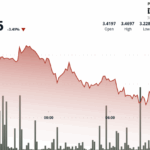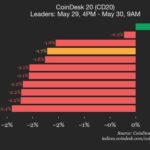
El Salvador Finalizes IMF Agreement and Maintains Bitcoin Assets Despite Fiscal Adjustments
El Salvador and the International Monetary Fund (IMF) have come to an agreement at the staff level regarding the initial evaluation of the country’s 40-month Extended Fund Facility (EFF) arrangement.
This agreement awaits the nod from the IMF’s Executive Board and is contingent upon the fulfillment of specified conditions.
Fiscal Developments and Reforms
As noted in a collaborative statement from IMF representatives Rodrigo Cubeddu and Luis Torres, El Salvador has demonstrated robust performance early in the program. The nation has successfully achieved essential fiscal and reserve objectives while progressively implementing governance and financial stability reforms.
“Significant advancements have been made in the execution of the economic reform strategy under the IMF-endorsed program. Most targets set for the first review have been comfortably met, and progress with structural benchmarks is on track,” remarked the officials.
They further highlighted that the economy continues to grow, bolstered by investor confidence and strong remittance inflows. The importance of sustaining fiscal consolidation and structural reforms to rectify macroeconomic disparities and promote sustainable growth was also underscored.
As part of the agreement, El Salvador will maintain its measures for fiscal tightening. This includes reductions in public sector wages, limiting current expenditures, and upcoming revisions to the civil service and pension systems. These initiatives will be reinforced by the forthcoming Fiscal Sustainability Law, with plans to increase deposits at the central bank to enhance external reserves.
IMF’s Position on Bitcoin
Even with the strides made, the IMF has reiterated its concerns regarding El Salvador’s approach to Bitcoin. It has indicated that measures are in place to prevent any increase in the government’s Bitcoin holdings.
“Regarding Bitcoin, efforts will persist to ensure that the total amount of Bitcoin held across all government-owned wallets remains unchanged,” stated the officials.
Furthermore, initiatives are underway to conclude public sector engagement with the Chivo wallet by the end of July.
In December 2024, a $1.4 billion agreement was established, stipulating conditions to limit the country’s crypto-related activities. The terms mandated that the acceptance of Bitcoin in the private sector would remain voluntary while curbing public sector participation in such transactions.
These stipulations were later incorporated into national law through amendments enacted by El Salvador’s Congress. The IMF Executive Board subsequently sanctioned the financing agreement in February 2025, facilitating an initial disbursement of $120 million, contingent on approval.
Notwithstanding the imposed restrictions on cryptocurrency involvement, El Salvador’s Bitcoin Office has persisted with its strategy of acquiring one Bitcoin each day. As of May 28, 2025, the nation holds roughly 6,190 Bitcoin, valued at around $675 million.
President Nayib Bukele has consistently maintained that cryptocurrency remains integral to his vision for the country.



















Post Comment